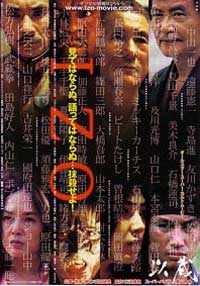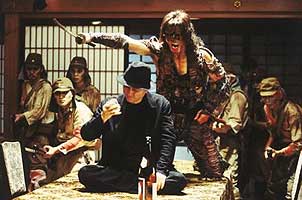 Takeshi Miike, probably best liked for ultraviolent yakuza films & in particular for Ichi the Killer, now & then attempts a chambara or swordplay film. Whether or not he does chambara as well, there's no question but that there's something appealing about Izo: Kaosu mataha fujori no kijin. It is almost all action & really did require more of a story. Takeshi Miike, probably best liked for ultraviolent yakuza films & in particular for Ichi the Killer, now & then attempts a chambara or swordplay film. Whether or not he does chambara as well, there's no question but that there's something appealing about Izo: Kaosu mataha fujori no kijin. It is almost all action & really did require more of a story.
It has a set-up/excuse for endless swordplay & slaughter, & that's about it, despite that some Miike fans have been induced to look more deeply into the possibility of a greater mythos underlying the surface of mere carnage, & the film would in fact make an interesting starting point for a discussion of some of the gloomier sorcerous aspects of esoteric buddhism, with Izo the destroyer of ego.
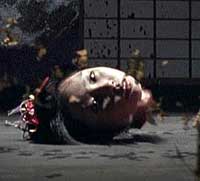 Izo is an elemental spirit, a representative of chaos, in the form of a ghostly samurai. He arose from the cruel torture & death by crucifixion centuries earlier. He haunts time, killing just about everyone he encounters. Izo is an elemental spirit, a representative of chaos, in the form of a ghostly samurai. He arose from the cruel torture & death by crucifixion centuries earlier. He haunts time, killing just about everyone he encounters.
Because he is not bound to time, we see his encounters in the past & present, & sometimes the two blend, as when modern riot control officers pursue him in a medieval village, or when a gang of medieval gamblers surround him in the streets of modern Tokyo.
As each encounter ends, he slips through the ground, or through a door, or around a corner, or through a window into another time or place & starts anew his endless slaughter with scarsely any interuption. He is seriously wounded, but as an elemental, nothing can actually kill him.
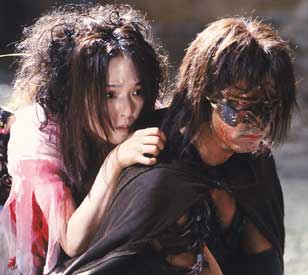 His goal is to kill everything in his path as he strives to reach the meeting room of titans of industry, crime, religion, & politics (among whom Takeshi "Beat" Kitano appears in what amounts to an extended cameo). These bigshots verge on being kami spirits themselves, but they can most certainly be killed, unlike Izo appears to be invulnerable. They apparently serve a young emperor-like god who Izo will stand before in the end, to be silently judged. His goal is to kill everything in his path as he strives to reach the meeting room of titans of industry, crime, religion, & politics (among whom Takeshi "Beat" Kitano appears in what amounts to an extended cameo). These bigshots verge on being kami spirits themselves, but they can most certainly be killed, unlike Izo appears to be invulnerable. They apparently serve a young emperor-like god who Izo will stand before in the end, to be silently judged.
Some have interpretted the Powers he is trying to destory as personfying elements of himself, & his only true victim is himself. I think such interpretations seek too much for meaning in a merely chaotic setting. As I seek meaning in the film's chaos, I'd impose the interpretation that Izo has arisen to challenge personificaitons or authorities who have defined civilization, & Izo would destroy civilization for having gone awry. Just about everyone who appears before him is slaughtered without regret, but when he spares a hard-working farming couple, it would appear to be because they are incorruptible; they are the only representatives of civilization in an unpolluted condition.
There are also strange issues surrounding Izo's responses to female figures who represent mother (or earthmother) as harlot, needy maiden, & nurturer. The nurturer he fears more than he fears violent forces, & cuts the harmless old woman in half with an attitude of terror rather than with the hatred he feels for other authorities. The harlot-mother on the other hand he screws with violent glee even as she declares him to be her son.
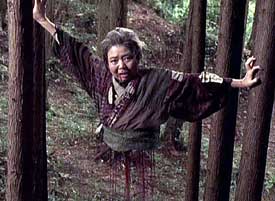 These "interludes" between endless scenes of swordplay could be interpretted as merely the aggressive sort of misogyny that finds its way into the majority of exploitation films, though it definitely does have a feeling of occurring on some other plain where Heaven & Hell have become comingled, & all these figures are insane gods & goddesses. These "interludes" between endless scenes of swordplay could be interpretted as merely the aggressive sort of misogyny that finds its way into the majority of exploitation films, though it definitely does have a feeling of occurring on some other plain where Heaven & Hell have become comingled, & all these figures are insane gods & goddesses.
The film has a certain poetry in addition to being endlessly violent. But what it lacks is a narrative drive, so that it mainly has to be watched as violence for violence sake, & is thereby periodically tedious. Yet it's so imaginative in its surrealistic approach that it keeps regaining viewer attention. I'd call it a successful film though not one of Miike's best. He can make really great films & really shitty films. I would assess this one as in the middle, though if one assumes Miike's cinematic goal has always been to achieve an apex of sheer violent rhythm, then Izo could be regarded his highest achievement in that limited sense.
I am capable of watching & enjoying some pretty bad films & since Izo is not actually bad I had no complaints. But there is one element of the film that held me rapt, & that's the recurring appearance of folksinger Kazuki Tomokawa. To call Kazuki a folksinger underestimates him, because he's edgy & modern & a genuine poet, really more the Japanese Leonard Cohen or Tom Waits than the Japanese Woodie Guthrie. Kazuki is a wonderful presence whose songs function almost like a Greek chorus for the madness & chaos brought by Izo. Kazuki absolutely brilliantly rules; he gives the film more of a soul than it would otherwise have possessed.
copyright © by Paghat the Ratgirl
|
